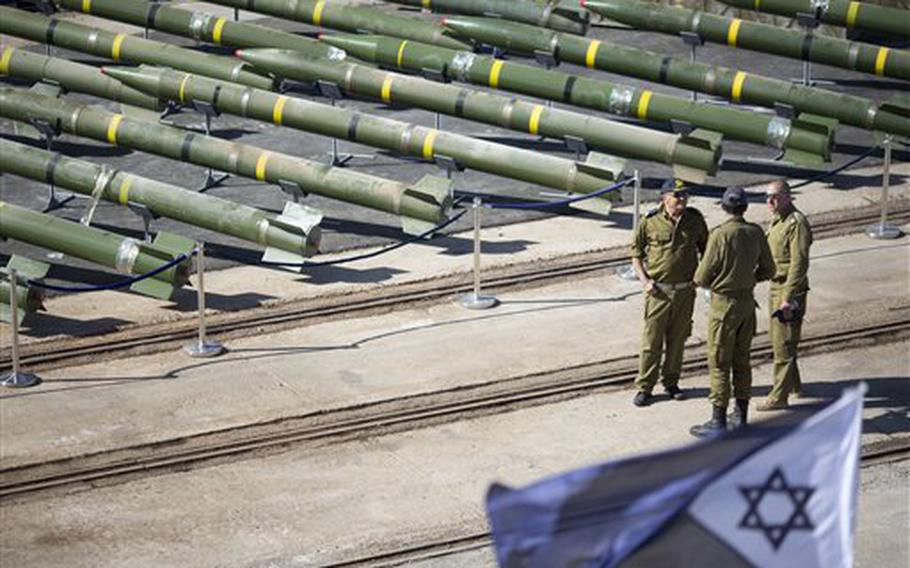
Israeli naval officers stand at a military port in the Red Sea city of Eilat, Israel, on Monday, March 10, 2014, with dozens of rockets seized from a Panama-flagged civilian cargo ship that Israel intercepted off the coast of Sudan. (Ariel Schalit/AP)
EILAT, Israel --- Israel's prime minister on Monday triumphantly toured a display of dozens of rockets that navy commandoes intercepted on the Red Sea last week, allegedly on their way from Iran to the Gaza Strip, and angrily accused the international community of ignoring Iranian support for militant groups while falling victim to an outreach campaign by the new leadership in Tehran.
Benjamin Netanyahu's visit to this Red Sea port capped a five-day PR blitz aimed at persuading world powers to toughen their position in nuclear talks. So far, the international reaction has been subdued, illustrating the uphill battle the Israeli leader faces in his efforts to change the minds of world leaders about Iran's outreach to the West.
"Iran, a brutal regime, has not abandoned its deep involvement in terrorism, its systematic efforts to undermine peace and security throughout the Middle East and its ambition to destroy the state of Israel," Netanyahu said. "What is new is not Iran's deeds or its lies, but the desire of many in the international community to bury their heads in the sand."
The tough comments threatened to further strain Netanyahu's already tense relations with the European Union and the White House.
Israel believes that Iran is trying to build a nuclear weapon, saying a nuclear-armed Iran would pose a threat to the existence of the Jewish state. It cites Iranian calls for Israel's destruction, its development of long-range missiles and its support for hostile militant groups on Israel's borders. Iran says its nuclear program is for peaceful purposes.
Netanyahu has been an outspoken critic of the efforts by six world powers to negotiate a deal with Iran that would substantially scale back its nuclear program in exchange for ending international sanctions. He says a current, interim deal gives Iran too much relief while getting little in return, and fears a final agreement would leave Iran with the capability to make a bomb.
Since last Wednesday's naval raid, Netanyahu has done his utmost to use persuade the world that the shipment revealed the "true face" of Iran.
As the raid was announced, the military released slick video presentations illustrating the circuitous 5,000-mile (8,000 kilometer) route that it says the weapons had been meant to take - starting in Syria, then to Iran and Iraq before heading toward Sudan and overland to Gaza - along with clips showing naval commandos discovering the rockets far out at sea.
The government gave a hero's welcome to the returning naval commandos and released more videos when the seized ship, the KLOS C, arrived in Eilat over the weekend. To help ensure heavy coverage of Monday's event, the government organized a special flight for the media to make the trip to Eilat, otherwise a four-hour drive along treacherous, narrow roads from Jerusalem and Tel Aviv.
Dozens of the green rockets were displayed on metal stands behind a podium where Netanyahu spoke. Stacks of bullets and plastic-wrapped mortar-shells lay nearby.
George Jahn in Geneva and Juergen Baetz in Brussels contributed to this report.